高考英语总复习完整版(共15讲)
- 格式:doc
- 大小:2.13 MB
- 文档页数:194
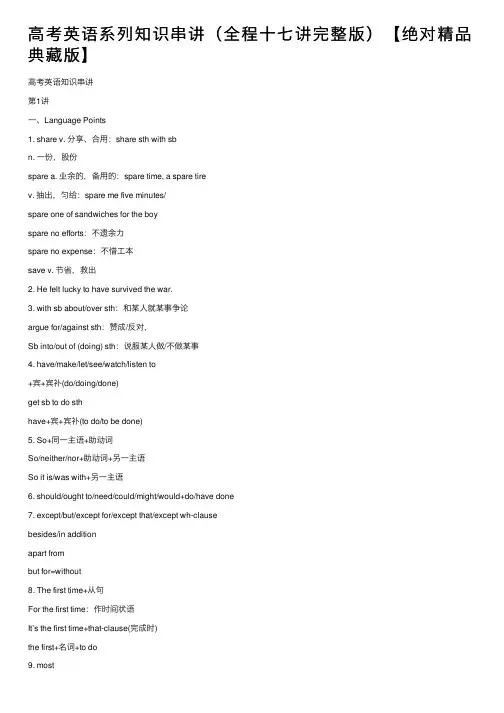
⾼考英语系列知识串讲(全程⼗七讲完整版)【绝对精品典藏版】⾼考英语知识串讲第1讲⼀、Language Points1. share v. 分享、合⽤:share sth with sbn. ⼀份,股份spare a. 业余的,备⽤的:spare time, a spare tirev. 抽出,匀给:spare me five minutes/spare one of sandwiches for the boyspare no efforts:不遗余⼒spare no expense:不惜⼯本save v. 节省,救出2. He felt lucky to have survived the war.3. with sb about/over sth:和某⼈就某事争论argue for/against sth:赞成/反对,Sb into/out of (doing) sth:说服某⼈做/不做某事4. have/make/let/see/watch/listen to+宾+宾补(do/doing/done)get sb to do sthhave+宾+宾补(to do/to be done)5. So+同⼀主语+助动词So/neither/nor+助动词+另⼀主语So it is/was with+另⼀主语6. should/ought to/need/could/might/would+do/have done7. except/but/except for/except that/except wh-clausebesides/in additionapart frombut for=without8. The first time+从句For the first time:作时间状语It’s the first time+that-clause(完成时)the first+名词+to do9. mostmost of the +n.(pl)/pron.the majority of (the)mostly: 主要地(状)10. be equal to sth:与,相等be equal to (doing) sth:胜任(做)某事equal sth:与,相等equal sb in sth:在,⽅⾯与某⼈匹敌11. compare,to/with,compared to/wit h,12. a great manyseveral/two dozen/hundred +n.(pl.)(many) dozens ofa great many of +the/these/those+n.(pl.)seveal/two dozen of +pron.13. much too+adj/adv(原级)too much+n.(u.)too many+n.(pl.)14. 没有被动态come about(主要⽤于疑问句、否定句)happen(表⽰偶然、碰巧之意)sth+ take place(多表⽰有组织、有计划)break out(指战争、灾害、疾病等的爆发)occur(与happen通⽤)It occurs to sb that/to do,:某⼈突然想起,15. n./pron./adj./adv./prep-phraseto do:表将来With+宾+宾补doing:表正在进⾏Done:表过去16. 强调句型的判断⽅法:如果将句⼦中的“it be”和“that”去掉,原句通顺则是强调句,否则就不是强调句。


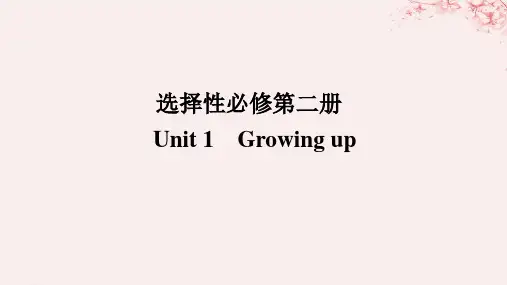
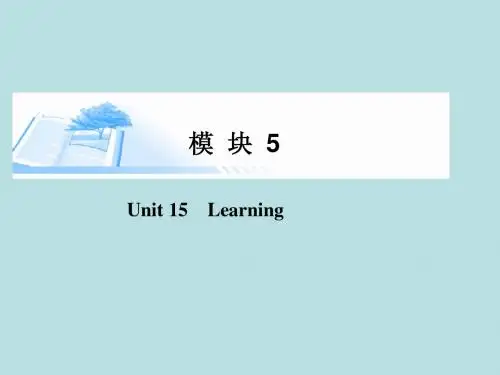

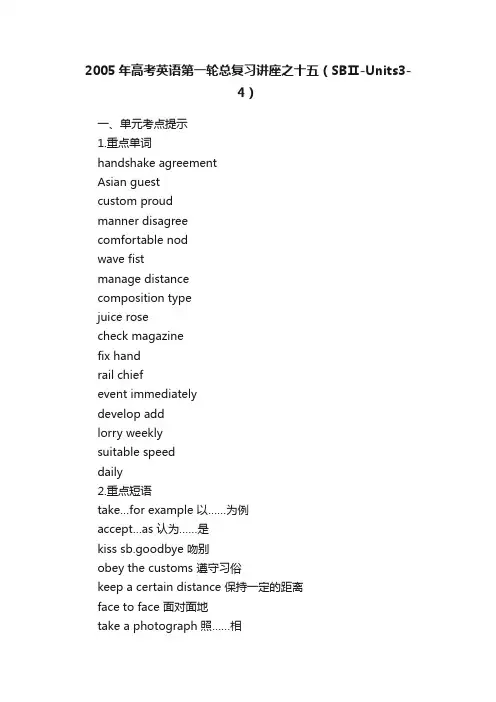
2005年高考英语第一轮总复习讲座之十五(SBⅡ-Units3-4)一、单元考点提示1.重点单词handshake agreementAsian guestcustom proudmanner disagreecomfortable nodwave fistmanage distancecomposition typejuice rosecheck magazinefix handrail chiefevent immediatelydevelop addlorry weeklysuitable speeddaily2.重点短语take…for example 以……为例accept…as 认为……是kiss sb.goodbye 吻别obey the customs 遵守习俗keep a certain distance 保持一定的距离face to face 面对面地take a photograph 照……相get down 开始(认真做某事)as well as 也,又be popular with sb. 受某人欢迎work on 从事3.重点句型What (How)about…?make oneself understoodwhile表对比either…or;not… but…They are said to be very good.There is no more time left for adding new stories. 4.交际英语Can /shall I help you?Would you like some help?Would you like me to do…?Where is the best place to meet?Shall we meet at six?What time shall we meet?Do you know what they are?5.语法部分否定;with + n. + 补足成分构成独立主格结构;动词不定式作主语时的形式主语it;疑问词后跟动词不定式;动名词作主语和宾语。
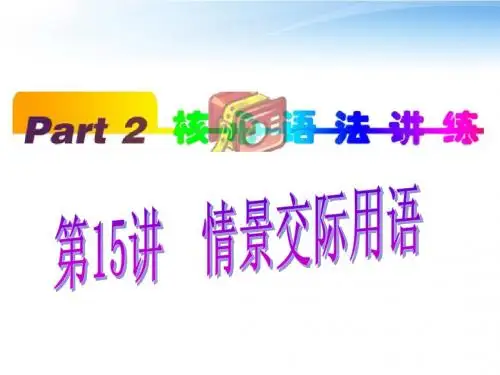



2024年高考英语语法复习课件完美版一、教学内容本课件依据《普通高中英语课程标准》和2024年高考英语考试大纲,围绕教材《英语》必修一到必修五的语法知识点进行复习。
详细内容包括:时态、语态、非谓语动词、名词性从句、定语从句、状语从句、倒装句、强调句等章节,结合高考真题,帮助学生全面掌握英语语法。
二、教学目标1. 熟练运用各种时态、语态,正确区分非谓语动词的用法。
2. 掌握名词性从句、定语从句、状语从句的引导词和基本结构,提高阅读理解能力。
3. 了解倒装句、强调句的构成和用法,提升写作水平。
三、教学难点与重点1. 教学难点:非谓语动词、名词性从句、定语从句、倒装句、强调句的用法。
2. 教学重点:时态、语态的正确运用,各类从句的引导词和结构,以及倒装句、强调句的构成。
四、教具与学具准备1. 教具:多媒体教学设备、PPT课件、黑板、粉笔。
2. 学具:教材、《英语语法指南》、笔记本、练习本。
五、教学过程1. 导入:通过展示一段关于时间变化的视频,引导学生回顾时态、语态的知识点。
2. 讲解:结合PPT课件,详细讲解各类语法的用法,穿插例题讲解和随堂练习。
3. 练习:分组讨论,让学生互相出题,检验学习效果。
5. 作业布置:布置课后作业,要求学生按时完成。
六、板书设计1. 时态、语态表格2. 名词性从句、定语从句、状语从句结构图3. 倒装句、强调句构成示例七、作业设计1. 作业题目:(1)完成《英语》必修一到必修五的语法练习题;(2)根据所给句子,改写为倒装句、强调句;(3)用非谓语动词改写下列句子。
2. 答案:(1)见教材课后练习;(2)见教材课后练习;(3)见教材课后练习。
八、课后反思及拓展延伸1. 反思:关注学生的学习情况,了解他们在语法学习中的困难,及时调整教学方法。
2. 拓展延伸:推荐学生阅读英语语法书籍,提高语法水平,为高考英语复习奠定基础。
同时,鼓励学生参加英语角、英语演讲比赛等活动,提升英语实际应用能力。
高考英语总复习高考英语总复习第一讲第一部分词汇精讲词汇精讲1)stare /stεə/ vi. & vt. 凝视,注视(表示“看”的词汇look / stare/ glance/ glare/ peep,注意辨别)2)wave /weiv/ vi. 挥手示意,致意3)recover /r i'kʌvə/ vi . & vt. 痊愈;恢复;重新获得4)base /beis/ vt. 以……为根据n. 基部;基地;基础5)request /ri'kwest/ n. & vt. 请求;要求6)prefer /pri'fə:/ vt. 更喜欢7)stand /stænd/ vt. 忍耐8)recognize /'rekəɡnaiz/ vt. 辨认出;承认;公认9)struggle /' strʌɡl/ n. & v. 斗争,拼搏10)protest /prəu'test/ n.& v. 抗议11)persuade /pə'sweid/ vt .说服12)commit /kə'mit/ vt.犯(错误),干(坏事)13)burst /bə:st/ vi. (burst , burst) 爆裂;爆发14)react /ri'ækt/ vi. 反应15)involve /in' v ɔlv/ vt .涉及,参与16)recognize vt.认识;认得;辨认出vi. 确认,承认;具结①1)辨认出=I didn't recognize you in your uniform.②2)承认=The World Health Org anization has recognized alcoholism as a disease since 1951.③3)be recognized as:被公认为= Lawrence's novel was eventually recognized as a work of genius.17)disaster /,di'zɑ:stə/ n. 灾难18)attitude /'ætitju:d/ n. 态度;看法19)occasion /ə'keiʒən/ n. 场合20)pressure /'preʃə/ n. 压力21)upset /ʌp'set/ adj. 心烦意乱的;22)stressful /'stresfəl/ adj. 充满压力的,紧张的23)remote /ri'məut/ adj. 遥远的24)crowded /'kraudid/ adj. 拥挤的25)upset /ʌp'set/ adj. 心烦意乱的;各种“生气”的表达要牢记:26)be annoyed with27)be upset with28)be angry (mad) with29)be cross with30)be furious with31)lose one’s temper with32)amazing /ə'meiziŋ/ adj. 令人惊异的①吃惊的: surprised / astonished /amazed / astounded②震惊的: shocked /horrified /Stunned33)keen /ki:n/ adj. 热心的,渴望的;热爱的34)词群“喜欢”①be (extremely) fond of②be keen on③be enthusiastic about④adore⑤be addicted to⑥have a passion for⑦appeal to词组精讲1.词群“喜欢”be (extremely) fond ofbe keen onbe enthusiastic aboutadorebe addicted tohave a passion forappeal to2. wave vi. 挥手示意,致意wave at sbwave sb goodbye/farewellbid sb goodbye/farewellbid/wave goodbye/farewell to sb例: When the party was over, he _____ his friends goodbye and _____A. bade; departedB. said; leftC. waved; wentD. remarked; retired3. recover vi . & vt. 痊愈;恢复;重新获得vt)重新获得;找回=regain找回被偷的钱包=Recover my stolen wallet重获勇气=I recover my interest in English2) vi 恢复,康复recover from+病: 我的哥哥已经感冒康复=My brother has recovered from the cold.recover from the shock/surpriserecover from my pressure例题:(包头市田家炳中学高一)It took him a year to _____ from the disaster.A. returnB. reviseC. recoverD. reply4. base /basis/ vt. 以……为根据n. 基部;基地;基础base A on B:把A建立在B的基础上我把我的理论建立在事实基础上我们把友谊建立在尊重的基础上be based on必须背诵:=be founded on =be rooted in= be on the basis ofThe cartoon is based on a Chinese novelI base my theory on facts./Our theory is based on facts例题:(人教版高一期中练习)Many students believe the choice of their courses and university should _____ their own interest.A. be based onB. base onC. be basing onD. base at例题:(北京二中)_____ do you base your calculationA . on which B. on what C . about what D. for what5. request /ri'kwest/ n. & vt. 请求;要求request sb to do sthAll club members are requested to attend the meeting.我请求你帮助我 I ask you to help me.=I ask you for help.May I request a favor of you?请您帮一下忙好吗?agree to one’s request 答应某人的请求/ come at one’s request 应某人的要求而来6. prefer /pri'fə:/ vt. 更喜欢prefer A to B :比起A,更喜欢Bprefer doing to doingprefer to do rather than do= would rather do than do例如:比起打车(take a taxi),我更愿意坐公交(take a bus)比起看小说,我更愿意看电视例题:(山东青岛)---why don’t you play with them?---I _____ sleep _____ play such uninteresting gameA . prefer to B. prefer to…than to C . would rather than D. would rather…than to7.stand /stænd/ vt. 忍耐,忍受1) bear 2) can stand 3) tolerate 4) endure 5) put up with 6) live with例题:(北京高考)I can’t stand______ with Jane in the same office. She just refuses ______talking while she worksA.working, stoppingB. to work, stoppingC. working, to stopD. to work, to stop8. recognize /'rekəɡnaiz/ vt. 辨认出;承认;公认1)辨认出=I didn't recognize you in your uniform.2)承认=The World Health Organization has recognized alcoholism as a disease since 1951.3)be recognized as:被公认为=Lawrence's novel was eventually recognized as a work of genius.例题:2010北京高考完形填空The shy, quiet freshman achieved success that year. I was ____in the program as"Student Art Assistant".A . introduced B. recognized C. identified D. considered9. struggle /' strʌɡl/ n. & v. 斗争,拼搏Struggle with sb重点词组:struggle to do:拼命去做..努力去做There are too many families struggling to survive on low incomes我努力每天背100个单词(翻译)10. protest /prəu'test/ n.& v. 抗议protest agaist sth 抗议…11. persuade /pə'sweid/ vt .说服persuade sb to doI persuaded her to go out for a drink with me.persuade sb into doingtalk sb into doing例题:He _____his daughter _____her mind, but she rejected.A. persuaded; to changeB. tried to persuade; into changingC. prevented; from changingD. tried to prevent; to change12. commit /kə'mit/ vt. 犯罪,做错事;把...交托给;指派…作战;使承担义务commit oneself 承诺,答应负责commit suicide 自杀commit a crime 犯罪;犯下罪行commit crime 犯罪;干坏事commit murder 谋杀commit sb to doing sth 承诺某人做某事The government must commit itself to improving health care.13. burst /bə:st/ vi. (burst , burst) 爆发,突发;爆炸 vt. 爆发,突发;爆炸n. 爆发,突发;爆发Burst (v)突然破裂例句:Water-pipes often burst in cold weatherThe dam burst under the weight of water.burst into 闯入;情绪的突然发作burst out 闯出来;突发;摆脱;大声喊叫burst in 闯入;突然出现;打断必背词组:嚎啕大哭: burst into tears=burst out crying放声大笑: burst into laughter= burst out laughing引吭高歌: burst into songs= burst out singing欢呼鼓舞:burst into applause=burst out applauding15. involve /in' vɔlv/ vt .涉及,参与;牵涉;使陷于;潜心于例句:This project involves much difficulty.这一项目有许多困难.The case involved many innocent people. 这一案件牵涉了许多无辜的人。